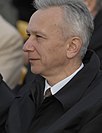2004 Ostric regional election
| |||||||||||||||||||||||||||||||||||||||||||||||||||||||||||||||||||||||||||
All 15 seats in the Dorada 8 seats needed for a majority | |||||||||||||||||||||||||||||||||||||||||||||||||||||||||||||||||||||||||||
|---|---|---|---|---|---|---|---|---|---|---|---|---|---|---|---|---|---|---|---|---|---|---|---|---|---|---|---|---|---|---|---|---|---|---|---|---|---|---|---|---|---|---|---|---|---|---|---|---|---|---|---|---|---|---|---|---|---|---|---|---|---|---|---|---|---|---|---|---|---|---|---|---|---|---|---|
| |||||||||||||||||||||||||||||||||||||||||||||||||||||||||||||||||||||||||||
| |||||||||||||||||||||||||||||||||||||||||||||||||||||||||||||||||||||||||||
The 6th Ostric regional election occurred on 4 April 2004. Jón Burgstaller's Social Democratic Radical Party successfully won a third term in office, albeit with a lower share of the vote and losing two seats. The populist Ostric Coalition surged to become the second-largest party, and the main component of the separatist camp. After the election, a SRPO-Liberal coalition was formed, with outside support from the conservative National Consolidation Party
Background
In the previous election, the social democratic SRPO maintained its strong lead, forming a grand coalition with the Ostric Liberal Party.
Although the SRPO itself remained popular, issues arose in the summer of 2001, when it was revealed that Arne Gotti, leader of the OLP and Minister of Labour, Education, and the Environment, had taken bribes from various fisheries to push deregulation. The government's approval ratings sank afterwards, but remained above the opposition. Concurrently, the Ostric Coalition saw its polling improve substantially during the term.
Electoral system
The electorate elects all fifteen members of the Dorada using single non-transferable vote in one island-wide multi-member constituency.
Results
| Party | Votes | % | Seats | +/– | |
|---|---|---|---|---|---|
| Social Democratic Radical Party | 4,290 | 32.93 | 5 | –2 | |
| Ostric Coalition | 3,172 | 24.35 | 4 | +3 | |
| Ostric People's Party | 2,522 | 19.36 | 3 | 0 | |
| Ostric Liberal Party | 1,634 | 12.54 | 2 | –1 | |
| National Consolidation Party | 1,410 | 10.82 | 1 | 0 | |
| Total | 13,027 | 100 | 15 | 0 | |
| Registered voters/turnout | 16,528 | 78.82 | – | – | |
Reactions
After the announcement of the results, Minister-Chairman Burgstaller stated he preferred renewing the coalition with the OLP, adding the NKP alongside. Initially, Konrad Roth stated the NKP would join the opposition. However, Roth agreed to a supply-and-confidence agreement with the new government.
Emphasis was placed on the Ostric Coalition's second place finish, and the bolstering of the separatist movement behind Léch Kneller, as well as the continuing slow decline of the Ostric People's Party.



